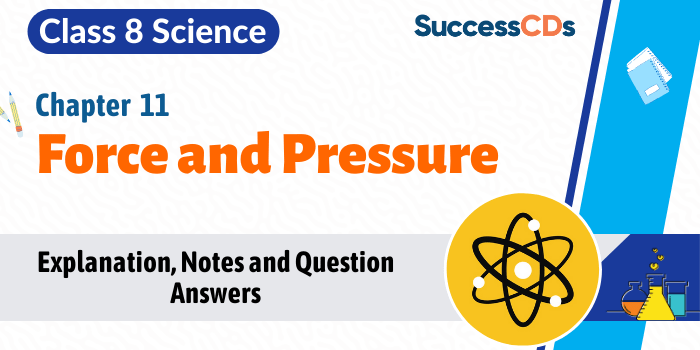
Force and Pressure Class 8 Science Chapter 11 as per NCERT Book used in CBSE and other Schools. The lesson covers the complete explanation of class 8 Chapter 11 Force and Pressure. Topics covered are force and types of force, fluids and fluids pressure. The lesson covers all important questions based on force and pressure. NCERT solutions to book questions have also been provided for convenience of the students.
| force | muscular force | Manometer |
| types of force | Pressure | atmosphere |
| contact force | fluids | atmospheric pressure |
| non – contact force | fluid pressure | NCERT Book Solutions |
Force
Force plays a great role in our life as it is helpful in doing any work. Like in playing cricket and basketball. We need force to play. Force is defined as a push or a pull or we can say force is a physical quantity that can change the speed, state, direction and dimension of an object. For example, when we put the force on the door it opens.
Force and Pressure Class 8 Video Explanation
The changes that force can bring are written as follows:
 Change in speed
Change in speed
If someone pushes your bicycle, it starts moving faster. In this case, the force that we apply on the bicycle changes the speed of the bicycle. Speed can be increased or decreased also.
Note: Force comes into play when at least two bodies interact. Or we can say that two bodies are necessary to put force comes into play.
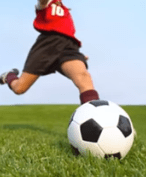 Change in state of body
Change in state of body
In this case, the body which is at rest can be put into motion or the body in motion goes in rest. For example: If a football placed on the ground is at rest, when you kick the football, it moves (comes in motion). We can also say that it changes the state of the body.
 Change in dimension
Change in dimension
Dimension means shape and size. When you blow a metal rod with a hammer, the dimension changes.
For example: For brushing the teeth, we need to squeeze the toothpaste and apply it on our brush. This leads to a change in the shape of the toothpaste.
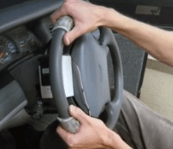 Change in direction
Change in direction
Force also leads to a change in direction. While playing cricket, the one who throws the ball, throws it in straight position with respect to the one who is doing batting. But the one who is batting hits the cricket ball in different direction.
Another example is that while we drive the car, we push the force on staring due to which car moves or changes the direction.
Types of Forces
There are two types of forces which are as follows:
- Contact Force
- Non-contact force
Contact Force
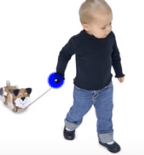 Contact force is the force that acts only when two bodies are in physical contact or two bodies interact with each other.
Contact force is the force that acts only when two bodies are in physical contact or two bodies interact with each other.
Examples of contact Force:
- Muscular Force
- Frictional Force
- Mechanical Force
Let us discuss them one by one-
Muscular Force
 It is the force exerted by the muscles. Like when we carry the purse or bag while moving, muscles play a great role. Example: Picking of school bags
It is the force exerted by the muscles. Like when we carry the purse or bag while moving, muscles play a great role. Example: Picking of school bags
Muscular force is the force that is caused by action of muscles inside the body. It is also a contact force. Like we cannot push or pull the book kept on a table without touching it. Or bucket filled with water cannot hold without touch. For this, we need to apply force that will be exerted with hands. This means our muscles play a role.
Animals make use muscular force to carry out physical tasks. Animals like bullocks, horses, donkeys etc need muscular force for different tasks.
Coolies use muscular force to lift luggage.
Athletes use this muscular force for running.
Frictional Force
It is the force that opposes the motion of one body over the surface of another body. It is a contact force. We can say that in this force, one body tries to move on the surface of another body.
For example, writing anything with pen, book lying on the table, and walking on floor.
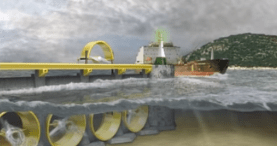 Mechanical force
Mechanical force
It is the force exerted by any kind of machine and obviously it needs contact of another body due to which it is also called a contact force. For example: Turbines in Hydel power station.
Non-Contact Force
It is the force that acts when bodies are not physically in contact with each other. For example: Falling of apple from trees.
Apples always fall down without being in contact with tree and it is due to the gravitational force of earth.
Examples of Non-Contact Force:
- Magnetic force
- Electrostatic force
- Gravitational force
Let us discuss them one by one-
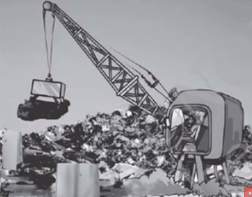 Magnetic force
Magnetic force
It is the force exerted by magnets on iron objects.
The force between magnet and iron is attractive type of force, which means it always attract toward each other and never repel each other. It is used in extracting scrap iron from garbage.
 Electrostatic force
Electrostatic force
It is the force of attraction or repulsion exerted between charged particles.
It can be either between same charges (repulsive, this means they repel each other) or between opposite charges (attractive, this means that they both attract each other).
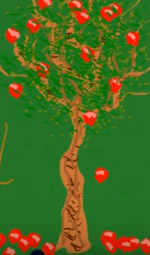 Gravitational force
Gravitational force
It is the force exerted by earth’s gravity on all objects. It is always attractive in nature.
For example: Falling of apple from tree or falling of any object when we through anything up.
Question: Give two examples of each of situations in which you push or pull to change the state of motion of objects?
Answer:
a. When we push a bicycle to move it.
b. When we pull the table it leads to change in position of table.
Question: Give two examples of situation in which applied force causes a change in the shape of an object?
Answer: When we press the foam, its shape is changed.
The shape of rubber band changes while we stretch the rubber band.
Question: A blacksmith hammers a hot piece of iron while making a tool, How does the force due to hammering affect the piece of iron?
Answer: The force due to hammering cause the change in shape of iron and iron can be molded in the shape of the required tool.
Question: Name the forces acting on a plastic bucket containing water held above ground level in our hand. Discuss why the forces acting on the bucket do not bring a change in its state of motion?
Answer: The forces exert on the bucket are muscular and gravitational force. The force acting on the bucket do not bring a change in state of motion because they are acting in opposite directions with equal magnitudes. Therefore, the net force acting on bucket remains zero.
Pressure
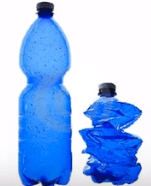 Pressure can be explained well with the following example. Do you think why it is easier to hammer a nail into the wall. It is because we apply a greater amount of force into a very small area of the screw head. In this case, the pressure is very high.
Pressure can be explained well with the following example. Do you think why it is easier to hammer a nail into the wall. It is because we apply a greater amount of force into a very small area of the screw head. In this case, the pressure is very high.
So we can say that pressure is the force exerted per unit area. Another example for this is that when we add hot water into a plastic bottle it melts due to pressure (atmospheric pressure).
Factors on which pressure depends are as follows:
- It is directly proportional to force. This means if pressure increases automatically force increases. Alternatively, if pressure decreases force also decreases.
- It is inversely proportional to area. This means that if pressure increases area decreases. But if pressure decreases area increases. We can say that they both are opposite to each other.
Formula: Pressure = Force/Area
Unit of pressure
S.I (system Internationale) Unit of pressure (System international unit) : PASCAL
1 PA= 1 NEWTON/1 METER SQUARE
Pressure is defined as 1 pascal when 1 Newton (it is SI unit of force) force is applied on 1-meter square (SI unit of area) area.
Let us discuss few facts of daily life which are based on Pressure:
 School bags have a wide strap
School bags have a wide strap
School bags have wide and thin straps, but we select the bag with a wide strap. Wide strapped bags are used because they are easy to handle.
We know that pressure is inversely proportional to area, therefore, the larger the area the lesser the pressure exerted therefore it becomes easy to carry a school bag with a wide strap.
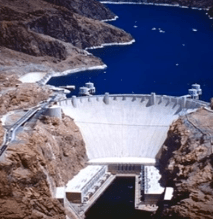 Dams have a wide base
Dams have a wide base
As we know that pressure is inversely proportional to area, therefore, the more the area the lesser the pressure exerted. Therefore high pressure exerted by dams can be born on ground and that avoids breakage of the dam. That is the reason why dams are always constructed with a wide base.
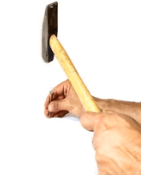 It is easier to hammer sharp nail
It is easier to hammer sharp nail
As we know that pressure is inversely proportional to area, therefore, the lesser the area the more the pressure exerted therefore it becomes easy to hammer that nail. That is the reason sharp nails are preferred over blunt nails.
It is difficult to walk on sandy floor with pencil heels
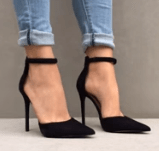 We know that pressure is inversely proportional to area, therefore, the lesser the area, the more the pressure exerted. Therefore it becomes difficult to walk on sand in pencil heels as it moves inside the sand. As heels are sharp and exert more pressure, our heels gets embedded into the soil and cause difficulty while walking. Even if we wear a flat shoe, we will have difficulty walking on sandy floor.
We know that pressure is inversely proportional to area, therefore, the lesser the area, the more the pressure exerted. Therefore it becomes difficult to walk on sand in pencil heels as it moves inside the sand. As heels are sharp and exert more pressure, our heels gets embedded into the soil and cause difficulty while walking. Even if we wear a flat shoe, we will have difficulty walking on sandy floor.
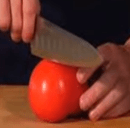 It is difficult to peel vegetables with a blunt knife
It is difficult to peel vegetables with a blunt knife
It is easy to peel vegetables with sharp knife instead of using blunt knife. This is because and also we know that pressure is inversely proportional to area therefore less is the area more is the pressure exerted.
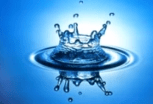 Fluids
Fluids
Fluids are those that can flow. For example: Liquids including water and gases including air. As we know that there are three sources of matter solid, liquid, and gas. In solid, particles are tightly packed and it is very difficult for those particles to flow. In liquid, the particles are loosely packed and it can flow easily. In gases, particles are extremely loosely packed and can also flow easily.
Fluid Pressure
It is defined as the pressure exerted by fluids.
Properties of Fluid Pressure
There are different properties of fluid pressure which are as follows:
- Pressure increases with an increase in depth. Like if we take a container filled with water. Suppose A is placed at the bottom and B is placed at the top of container. As per this property, the point A has high pressure.
- Pressure decreases with height. Like the one person who stands on plane experiences high pressure with respect to the one who stands on the top of a hill. Thus we can say that pressure decreases with depth.
- Pressure applied at any point is equally transmitted in all directions. Like we see water coming out from leaking pipes and taps flows in all directions. In case of a bath shower and fountain, water comes out tiny holes and flows in all directions.
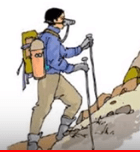 Pressure decreases with height
Pressure decreases with height
While climbing the hills, the pressure decreases with height. That is why we always carry oxygen cylinder with us while climbing. This cylinder is helpful in proper respiration.
Pressure applied at any point is equally transmitted in all directions
Like a flask which is filled with water. This flask has multiple holes. When we push the piston (placed at the top of flask), by doing this we are giving force per unit area (pressure). Due to this pressure applied, water flows equally in all direction.
 Pressure increase with the increase in depth
Pressure increase with the increase in depth
Let us take an example. Suppose there is a flask filled with water. Also suppose, there is a point A which is at the bottom of the flask and another point B which is placed at the top of the flask. The point A experiences high pressure with respect to point B.
Q. Why a camel can easily walk on sand?
Answer: This is due to the fact that nature has provided the camel with broad feet. Hence, when a camel walks on sand, the pressure exerted by it on the sand is quite small due to the increased area of contact, its feet do not sink much in the sand. Therefore, a camel can easily cross vast regions in deserts.
Q. Why do some people suffer from nose bleeding at high altitudes?
Answer: The atmospheric pressure is at a maximum on the surface of the earth. When we go to a higher altitude (say a high mountain), then the atmospheric pressure decreases. So, at high altitudes, the atmospheric pressure becomes much less than our blood pressure. Since our blood is at a higher pressure than the outside pressure, therefore, some of the blood vessels in our body burst and nose bleeding can occur at high altitudes.
Question: Why do climbers take oxygen cylinder along while climbing height?
Answer: Atmospheric Pressure decreases with height, therefore, oxygen available for breathing is comparatively less. As a result, nausea kind of disorder is commonly seen and sometimes the blood vessels get burst and mountaineers bleed through the nose (due to increased pressure). This is the reason that mountaineers carry oxygen cylinders with them.
Q. Why do astronauts wear special suits in space?
Answer: Spacesuits help astronauts in several ways. Spacewalking astronauts face a wide variety of temperatures. In the Earth’s orbit, conditions can be as cold as minus 250 degrees Fahrenheit. In the sunlight, they can be as hot as 250 degrees. A space suit protects astronauts from those extreme temperatures.
Spacesuits also supply astronauts with oxygen to breathe while they are in the vacuum of space. They contain water to drink during spacewalks. They protect astronauts from being injured from impacts of small bits of space dust.
Question: Why do deep sea divers wear special suits while diving?
Answer: Liquid pressure increases with depth: Pressure is high at the bottom therefore deep sea divers have to wear special suits to protect themselves from high pressure otherwise it may crush their bodies.
Q. Why an apple always falls to the ground from the tree?
Answer: The earth pulls the apples down due to the force of gravity or gravitational force.
Q. Why is a heavy truck fitted with six to eight wheels?
Answer: A heavy truck is fitted with six to eight wheels because increased area reduces the pressure on wheels so they do not burst or damage on the road. That is why truck has broad tyres so that there is less pressure on the ground and the tyres do not sink in the soil.
Q. Why do skiers use long flat skies to slide over snow?
Answer: Skiers use long and flat skies to slide on the snow. A large area of the cross-section of skies reduces the pressure on the snow and prevents the skiers from sinking into the soft ground. So, the skiers easily slide over snow without sinking their feet into the ground.
Time to check knowledge by answering the following questions-
Fill in the blanks :
- _________ is a push or pull acting on an object.
- Magnetic and gravitational forces are the types of _______ force.
- The S.I. unit of pressure is_______
- It is easier to carry school bags with ________straps.
- Foundations of high-rise buildings are kept________
- Iron nails can be separated from husk by using_________
Answers-
- force
- non – contact
- n/m² or pa
- broad
- wide foundation
- magnet
State whether True or False:
- The pressure in a liquid at greater depths is greater.
- A piece of rubber regains its shape on squeezing.
- Cutting and piercing tools have blunt edges.
- Camel cannot walk on sand due to its broad feet.
- Non-contact force can act from a distance.
- The syringe works on a principle of atmospheric pressure.
- People at plains suffer from nose bleeding.
- Fluids exert pressure.
Answer:
- true
- true
- false
- false
- true
- true
- false
- true
Let’s do some Activities:
Activity to show that pressure increases with depth
- Firstly, we need to take a plastic container.
- Then we need to make 3 holes at different heights.
- Put the container under a tap.
- Then we need to observe the force with which water flows out through all holes
- It is observed that water flows with great pressure from last hole as compare to the other holes.
- This shows that pressure increases with depth.
Question: How can gas pressure be measured?
Answer: Gas pressure can be measured by using an instrument called Manometer. It consists of u-shaped glass tube which contains mercury. The level of mercury is initially same in both arms to measure gas pressure. Then to measure gas pressure, we need to connect one side of the manometer with gas supply. By doing so, we can observe the pressure of gas.
Working of Manometer
The gas present in the manometer exert pressure therefore mercury level moves down in one limb and rises in other limb. The difference in the level of mercury in both arms determines gas pressure.
Atmosphere
We know that air is all around us. The atmosphere envelope of air around us called as atmosphere. It extends up to many kilometers.
There are five different layers present in the atmosphere.
Exosphere (topmost)
Thermosphere
Mesosphere
Stratosphere
Troposphere (bottom)
Atmospheric Pressure
It is the pressure exerted by the atmospheric air.
Question: Why does a rubber sucker stick to the wall when it is pressed against the wall?
Answer: When we press the rubber sucker most of the air between surface and rubber escapes out and sucker sticks to wall due to atmosphere pressure acting on it. To pull it back, one needs to apply certain force which should be enough to overcome atmospheric pressure.
Atmospheric pressure can be measured by instrument barometer:
It consists of a trough which contains mercury with inverted tube. As atmosphere exerts pressure the mercury level from trough moves up which gives the value of atmospheric pressure that is 760mm on mercury scale.
NCERT Book Solutions
MULTIPLE CHOICE QUESTIONS (MCQS)
- Opening the door is an example of which type of force?
- (a) contact force
- (b) spring force
- (c) non-contact force
- (d) magnetic force
Answer: (a) contact force
- What is the cause of change in motion or change in the state of motion?
- (a) Pressure
- (b) Friction
- (c) Atmospheric Pressure
- (d) Force
Answer: (d) Force
- A charged balloon attaches to a wall because of which force?
- (a) muscular force
- (b) magnetic force
- (c) electrostatic force
- (d) gravitational force
Answer: (c) electrostatic force
- A ball rolling on the ground slows down and finally stops. This is because of:-
- (a) force
- (b) less force applied
- (c) friction
- (d) none of the above
Answer: (c) friction
- In a tug-of-war, two teams pulling a rope does not move towards any team, it implies that:-
- (a) An equal force is being applied in the same direction
- (b) An equal force is being applied in opposite direction
- (c) no force is applied in any directions
- (d) cannot be explained
Answer: (b) An equal force is being applied in opposite direction
- Gravity is a which type of force?
- (a) repulsive force
- (b) attractive or Repulsive force
- (c) attractive force
- (d) not a force
Answer: (c) attractive force
- A push or pull on an object is called as?
- (a) pressure
- (b) Push-pull
- (c) force
- (d) all of above
Answer: (c) force
- The pressure of the water at the bottom of the pond is at the surface of the pond?
- (a) lower than
- (b) same
- (c) higher than
- (d) either lower or higher
Answer: (c) higher than
- The force involved in falling of an apple from a tree is known as?
- (a) magnetic force
- (b) electrostatic force
- (c) contact force
- (d) gravitational force
Answer: (d) gravitational force
- Which of the following is an example of a non-contact force?
- (a) The force exerted by us to lift a bucket
- (b) push a stationary car
- (c) The force exerted by magnets
- (d) hit a cricket ball for a 6 run
Answer: (d) hit a cricket ball for a 6 run
- Pressure is defined as?
- (a) Area/Force on which it acts
- (b) Force/Area on which it acts
- (c) Volume/Force on which it acts
- (d) Force/Volume on which it acts
Answer: (b) Force/Area on which it acts
Question: When a comb rubbed against hair and is brought near the small pieces of paper?
Answer: When a comb or a plastic ballpoint pen is rubbed on dry hair, an electric charge is produced on it. This electric charge exerts a pull on the bits of paper. Thus the force exerted by an electrostatic charge is called an Electrostatic Force.
Question: Why do bodies not get crushed due to intense atmosphere pressure?
Answer: It due to pressure inside our bodies which is just equal to atmospheric pressure.
Question: Activity to show liquid exerts pressure at the bottom of container?
Answer:
- Firstly, we need to take a tube of approximately length of 15cm.
- Take a piece of good quality rubber balloon.
- Stretch the rubber balloon over the end of tube.
- Then we need to hold the pipe in middle at vertical position.
- Now pour the water into it.
- You will notice balloon starts bulging.
- As more and more water is poured balloon bulges more.
Question: Activity to show liquid exerts pressure on walls of container also on the side of container.
For this activity
- We need to take a plastic bottle.
- Then fix cylindrical glass tube near to the bottom.
- Stretch rubber balloon on the mouth of tube.
- Now fill half of the bottle with water.
- Then, balloon starts bulging.
- It shows pressure is exerted on the walls of the container.
Question: Activity to show liquid exerts pressure at same depth?
- For this activity initially we need to take empty plastic bottle.
- Drill four holes near the bottom at same height.
- Now fill the bottle with water.
- Observe the streams of water coming out.
- Then we will see water flows with same pressure.
- This indicates that liquid exert equal pressure at same depth.
Question: Explain which type of force following are experiences:
- A horse pulling a cart —
- A sticker attached to steel almirah without glue—
- A coin falling to the ground—–
- A plastic comb rubbed in dry hair picking up tiny pieces of paper——–
Answer:
- contact force
- magnetic force
- gravitational force
- electrostatic force
Question: Why does a sharp knife cut objects more effectively than a blunt knife?
A sharp knife has a very thin edge of its blade. A sharp knife cuts objects (like fruits, vegetables) better because due to its very thin edge, the force of our hand falls over a very small area of the object.